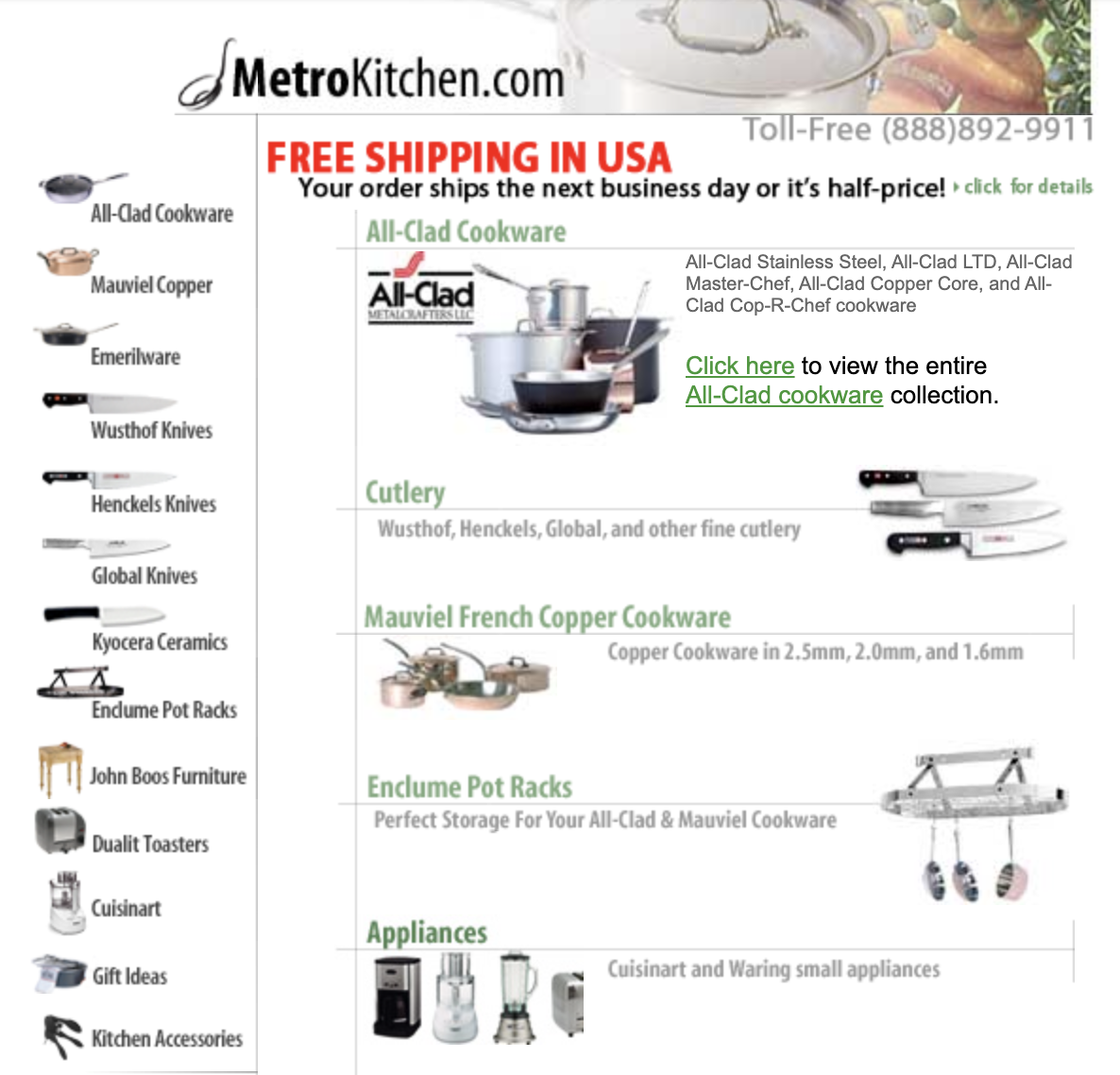MetroKitchen

Background

Launched in 1998, MetroKitchen.com quickly established itself as a trailblazer in the e-commerce landscape, specializing in selling high-end kitchen brands like All-Clad, Wusthof, and Henckels. From the outset, the company harnessed the power of search engine optimization to generate traffic and drive sales, particularly leveraging AltaVista when it was the search engine du jour. Additionally, MetroKitchen utilized pay-per-click (PPC) advertising in its infancy, acquiring clicks from platforms like GoTo.com, which eventually evolved into Overture and Yahoo Search Marketing.

MetroKitchen’s Struggle
MetroKitchen’s SEO strategy was multi-faceted. The company created a series of satellite websites with keyword-rich domain names and content, linking to the central MetroKitchen.com website. This approach was effective across various search engines, bolstering the site’s visibility and traffic.
Google’s Florida Update
By the fourth quarter of 2003, Google had eclipsed Yahoo as the leading search engine in the United States, boasting a market share close to 30%.
Then came Google’s “Florida Update” in November of the same year, a seismic shift that jolted the SEO landscape. MetroKitchen was among the many sites that felt the impact, particularly stinging, as it occurred right before the vital holiday shopping season. This watershed moment underlined Google’s pivotal role in search engine marketing. To mitigate the fallout, MetroKitchen promptly set up an Amazon Seller account to diversify its sales channels.
Solution
SEO & Content Optimization
Initially, the MetroKitchen brand lived across multiple domains and websites with similar designs and interfaces. Collaborating with their internal team, we consolidated all their websites under the MetroKitchen.com umbrella. Implementing 301 redirects to funnel traffic to their new homes on the primary domain improved its search engine rankings. As a result, MetroKitchen began to regain its lost Google search traffic and, importantly, its sales momentum.
Post-consolidation, we added a suite of new features to MetroKitchen.com, such as unique product pages filled with tailored content, an internal search engine to aid customers in finding products effortlessly, and revamped add-to-cart buttons designed to improve conversion rates.
Furthermore, we initiated a backlinking program to elevate the site’s domain authority and contacted those linking to old URLs, requesting they update their links.
Google Ads
Once we stabilized the SEO landscape, we focused on rejuvenating MetroKitchen’s lackluster Google Ads performance: optimizing campaigns, writing new ad copy, and a targeted keyword strategy was put into play. We deployed Google Ads conversion tracking to gauge our efforts in late October 2004. Come November and December, these initiatives culminated in a robust revenue of $444,126.19 against an ad spend of $44,405.75, effectively under 10% of the revenue.
Amazon Seller Central
The upheaval caused by Google’s Florida Update in 2003 prompted MetroKitchen to diversify by becoming one of the pioneering third-party retailers on Amazon. We ensured MetroKitchen’s products were listed prominently, even when competing with Amazon’s stock. By synchronizing our ASIN data feeds with Amazon’s, we gained a competitive edge—often winning the buy box when Amazon’s inventory ran low, leading to a noticeable spike in sales.
Shopping Comparison Sites
Following optimizing individual product pages, we extended MetroKitchen’s reach by listing its products on various shopping comparison platforms. These platforms included Shopping, Bizrate, PriceGrabber, and Froogle (aka Google Merchant Center), which drove additional traffic and increased sales.
The Results
Achieved a significant year-over-year revenue increase between 2003 and 2004, directly contributing to the company's successful sale the following year.
Revitalized MetroKitchen's PPC strategies, leading to cost-effective ad spend that was less than 10% of generated revenue.
Expanded the brand's digital footprint by diversifying sales channels, including a winning presence on Amazon and multiple shopping comparison sites, resulting in a consistent uptick in sales and traffic.
The Takeaway
Although Google’s unforeseen algorithmic shift came at the most inopportune time—right before the holiday rush—we navigated this turbulence by diversifying our marketing channels. Consolidating multiple affiliated websites into the main MetroKitchen.com domain bolstered our SEO performance, creating a unified and more navigable shopping environment for our customers. Moreover, this move paved the way for additional traffic-driving strategies, including integrating shopping comparison platforms and fine-tuning PPC campaigns.
The payoff from our strategic recalibrations was substantial. We achieved a commendable year-over-year revenue increase between 2003 and 2004, which played a significant role in facilitating the sale of the company by its founder, Dan Grossman, in the subsequent year. Our ability to adapt and produce measurable results did not go unnoticed—the new ownership was sufficiently impressed with our work to continue our partnership for many years.
Why Papaya Search
Papaya Search’s journey with MetroKitchen is a compelling case study on the power of adaptability and strategic innovation in e-commerce. By pivoting quickly, employing multi-channel strategies, and optimizing for contemporary SEO and advertising trends, MetroKitchen survived and thrived, even amid algorithmic changes that spelled the end for many e-commerce retailers. Our collaborative efforts in consolidating web assets, refining advertising campaigns, and leveraging third-party platforms like Amazon and various shopping comparison sites proved invaluable in revitalizing the brand.
Our collective strategies helped MetroKitchen recover lost revenue and set the stage for exponential growth, culminating in a lucrative exit for its founder. The enduring partnership with the new ownership is a testament to the lasting impact of our data-driven, customer-focused approach. This case study underscores the transformative power of proactive digital marketing and the significance of agility in today’s ever-changing digital landscape.

Bobby has a deep and intuitive understanding of online marketing, from web design to SEO to SEM/PPC, because he has a deep and intuitive understanding of how people use the web.
Dan Grossman, Aviation Historian at Airships.net

